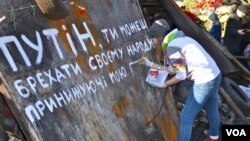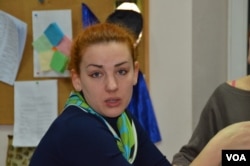KYIV —
As the confrontation between the West and Russia over Russia’s actions in Crimea unfolds Ukraine’s acting foreign minister has reiterated that while his country wants a peaceful resolution to the standoff with Russia, Ukrainians are unwilling to be held hostage to the “old Soviet-style” of threat and intimidation.
Comparing the Crimea quarrel with Russia to the three-month confrontation in Kyiv’s Maidan between protesters and the now ousted Ukrainian President Viktor Yanukovych, a Russian ally, Andrii Deshchytsia told a packed news conference on Saturday that Ukraine has changed in this revolution, the country’s fourth in nearly a century, and that it is moving on from the past and is carving out a true sense of national independence.
“All that happened in Ukraine is difficult to put in some patterns known from previous revolutions,” he said. “What is very promising here is that we are now using the creativity of a young Ukrainian generation, which is a strong weapon against the old Soviet-style pattern.”
The country’s top diplomat isn’t alone in identifying a new sense of national purpose and identity emerging in post-Yanukovych Ukraine—a country Russia’s Vladimir Putin once quipped wasn’t a real country.
A generational change
While international support for Ukraine in the tense and highly dangerous standoff over Crimea is helping to instill confidence in the country about a new, more West-aligned future, some analysts, as well as Ukrainians, say Ukraine is going through a generational change. That change is seeing the formation of a unifying post-Soviet Ukrainian national identity that is subsuming traditional linguistic splits between the country’s ethnic Russians and Ukrainians, they say.
“Can you notice now that the Ukrainian nation starts to speak with one voice, no matter whether people are from the left or right of the political spectrum,” says Petro Poroshenko, a lawmaker and business oligarch known as the “Chocolate King” for his confectionary empire.
Tipped as a possible candidate in the presidential elections slated for May, the 48-year-old Poroshenko was quick to throw in his lot with the Independence Square protesters who ousted Yanukovych following his decision not to sign a trade pact with the European Union in favor of closer ties with Russia. “The top priority for all Ukrainians is national sovereignty and territorial integrity,” Poroshenko says.
He argues that Russia’s strong-armed tactics in Crimea are having a quickening effect on the coalescing of Ukrainians. He acknowledges there is some restiveness in a handful of Ukrainian regions. But he insists ethnic Russian fears fomented by “fifth-columnists and agent provocateurs are proving less and less successful.”
Some Ukraine watchers say Putin may be surprised by the firm response among Ukrainians to his approach to Ukraine and the reaction his land-grab in Crimea, which has an ethnic Russian majority, has provoked.
Michael Willard, an American advertising executive and owner of a public relations agency in Kyiv, thinks the Russian leader views Ukraine through a Soviet-type prism, seeing the country as an offshoot of Russia. He argues Putin has misread Ukraine and missed the fact that since the break-up of the Soviet Union, Ukraine has started to develop along very separate lines.
“I have been in Ukraine for 20 years now and this whole country has totally changed over that period,” Willard says. “It is just like the old advert goes: it is not your father’s Oldsmobile, it is not Brezhnev’s Ukraine.” He says the young – those born since the collapse of Communism—are the drivers behind the shift.
East-west ethnic divide a fiction
Writing in America’s New Republic magazine, Julia Ioffe, a commentator on Russia and Ukraine, also pinpoints the shift away from Russia as originating with those born since 1991. She dismisses the “conventional wisdom” of looking at Ukraine as a country divided between a Europe-tilted Ukrainian-speaking West and a Moscow-favoring Russian-speaking East, noting that the east-west axis of ethnicity is a false one. The different ethnicities are more mixed.
“It would take a very talented surgeon to carve the two languages apart—or a charlatan to claim it can be done,” she wrote. “The real split is generational,” she argues.
Ukrainian military remains united
That may go some way to explain why there appears to be no ferment or apparent divisions inside the Ukrainian military.
Aside from the early defection of Ukraine’s navy chief Denys Berezovky, who swore allegiance to pro-Russian leaders in Crimea the day after he had been appointed as head of the navy by Kyiv authorities, the Ukrainian military has remained loyal to the interim Ukrainian government.
Russian appeals to Ukrainian navy and army personnel in Crimea to switch sides have fallen on deaf ears, even when military installations have been overrun.
Lt. Col. Olexandr Lomako, a deputy commander of an anti-aircraft regiment stationed 60 miles northeast of Sevastopol, told the Los Angeles Times: “The Russians captured our base and disarmed us only because they took us by surprise and because we didn’t want to start a big war by armed resistance.”
“I am shocked: I could never have imagined we would have such a loyal army,” says Lesya Orobets, an opposition politician and one of the leaders of the Maidan revolution. She says that is especially surprising since solders are poorly paid and the army was mismanaged under Yanukovych.
“All these days of crisis we have seen loyalty and rebuffs of Russian surrender demands,” she says. “When I saw news video of a group of Ukrainian soldiers marching towards armed Russian troops just waving our flag, I started crying.”
Orobets argues that the battlefield of the Maidan and the resistance to Yanukovych has acted as a forge for the shaping of a new Ukrainian national identity – it is one that has some way to go for completion, she says.
But everyday now in Kyiv the memory of the three-month struggle against Yanukovych is being remembered and honored. On the Maidan Ukrainians – old as well as young, in small and large groups – pick their through what was once a battlefield, adding more multi-colored flowers to the piles already placed where young revolutionaries fell to sniper bullets.
Comparing the Crimea quarrel with Russia to the three-month confrontation in Kyiv’s Maidan between protesters and the now ousted Ukrainian President Viktor Yanukovych, a Russian ally, Andrii Deshchytsia told a packed news conference on Saturday that Ukraine has changed in this revolution, the country’s fourth in nearly a century, and that it is moving on from the past and is carving out a true sense of national independence.
“All that happened in Ukraine is difficult to put in some patterns known from previous revolutions,” he said. “What is very promising here is that we are now using the creativity of a young Ukrainian generation, which is a strong weapon against the old Soviet-style pattern.”
The country’s top diplomat isn’t alone in identifying a new sense of national purpose and identity emerging in post-Yanukovych Ukraine—a country Russia’s Vladimir Putin once quipped wasn’t a real country.
A generational change
While international support for Ukraine in the tense and highly dangerous standoff over Crimea is helping to instill confidence in the country about a new, more West-aligned future, some analysts, as well as Ukrainians, say Ukraine is going through a generational change. That change is seeing the formation of a unifying post-Soviet Ukrainian national identity that is subsuming traditional linguistic splits between the country’s ethnic Russians and Ukrainians, they say.
“Can you notice now that the Ukrainian nation starts to speak with one voice, no matter whether people are from the left or right of the political spectrum,” says Petro Poroshenko, a lawmaker and business oligarch known as the “Chocolate King” for his confectionary empire.
Tipped as a possible candidate in the presidential elections slated for May, the 48-year-old Poroshenko was quick to throw in his lot with the Independence Square protesters who ousted Yanukovych following his decision not to sign a trade pact with the European Union in favor of closer ties with Russia. “The top priority for all Ukrainians is national sovereignty and territorial integrity,” Poroshenko says.
He argues that Russia’s strong-armed tactics in Crimea are having a quickening effect on the coalescing of Ukrainians. He acknowledges there is some restiveness in a handful of Ukrainian regions. But he insists ethnic Russian fears fomented by “fifth-columnists and agent provocateurs are proving less and less successful.”
Some Ukraine watchers say Putin may be surprised by the firm response among Ukrainians to his approach to Ukraine and the reaction his land-grab in Crimea, which has an ethnic Russian majority, has provoked.
Michael Willard, an American advertising executive and owner of a public relations agency in Kyiv, thinks the Russian leader views Ukraine through a Soviet-type prism, seeing the country as an offshoot of Russia. He argues Putin has misread Ukraine and missed the fact that since the break-up of the Soviet Union, Ukraine has started to develop along very separate lines.
“I have been in Ukraine for 20 years now and this whole country has totally changed over that period,” Willard says. “It is just like the old advert goes: it is not your father’s Oldsmobile, it is not Brezhnev’s Ukraine.” He says the young – those born since the collapse of Communism—are the drivers behind the shift.
East-west ethnic divide a fiction
Writing in America’s New Republic magazine, Julia Ioffe, a commentator on Russia and Ukraine, also pinpoints the shift away from Russia as originating with those born since 1991. She dismisses the “conventional wisdom” of looking at Ukraine as a country divided between a Europe-tilted Ukrainian-speaking West and a Moscow-favoring Russian-speaking East, noting that the east-west axis of ethnicity is a false one. The different ethnicities are more mixed.
“It would take a very talented surgeon to carve the two languages apart—or a charlatan to claim it can be done,” she wrote. “The real split is generational,” she argues.
Ukrainian military remains united
That may go some way to explain why there appears to be no ferment or apparent divisions inside the Ukrainian military.
Aside from the early defection of Ukraine’s navy chief Denys Berezovky, who swore allegiance to pro-Russian leaders in Crimea the day after he had been appointed as head of the navy by Kyiv authorities, the Ukrainian military has remained loyal to the interim Ukrainian government.
Russian appeals to Ukrainian navy and army personnel in Crimea to switch sides have fallen on deaf ears, even when military installations have been overrun.
Lt. Col. Olexandr Lomako, a deputy commander of an anti-aircraft regiment stationed 60 miles northeast of Sevastopol, told the Los Angeles Times: “The Russians captured our base and disarmed us only because they took us by surprise and because we didn’t want to start a big war by armed resistance.”
“I am shocked: I could never have imagined we would have such a loyal army,” says Lesya Orobets, an opposition politician and one of the leaders of the Maidan revolution. She says that is especially surprising since solders are poorly paid and the army was mismanaged under Yanukovych.
“All these days of crisis we have seen loyalty and rebuffs of Russian surrender demands,” she says. “When I saw news video of a group of Ukrainian soldiers marching towards armed Russian troops just waving our flag, I started crying.”
Orobets argues that the battlefield of the Maidan and the resistance to Yanukovych has acted as a forge for the shaping of a new Ukrainian national identity – it is one that has some way to go for completion, she says.
But everyday now in Kyiv the memory of the three-month struggle against Yanukovych is being remembered and honored. On the Maidan Ukrainians – old as well as young, in small and large groups – pick their through what was once a battlefield, adding more multi-colored flowers to the piles already placed where young revolutionaries fell to sniper bullets.









